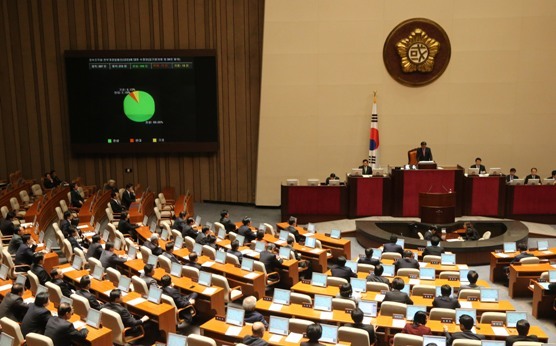The National Assembly approved the government reorganization bills on Friday, opening the way for President Park Geun-hye’s plans to be implemented 26 days after her inauguration.
Under the plans the government will be restructured to 17 ministries and three lower-level ministries, from the current format of 15 ministries and two low-level ministries.
Of the attending 212 lawmakers at the Assembly’s plenary session held in the afternoon, 188 approved the bill, while 11 opposed and 13 abstained.
The ruling Saenuri Party and the main opposition Democratic United Party had been wrangling over which government body to put in charge of broadcasting issues. The two sides had reached an agreement on Sunday, but the reorganization bill was once again delayed with members of the Culture, Sports, Tourism, Broadcasting and Communications Committee disagreeing over the scope of authority the new Ministry of Future Planning and Science should have with regards to licensing of concerned businesses.
 |
Lawmakers vote on the proposed revision on the Government Organization Act during the plenary session at the National Assembly in Seoul on Friday. (Yonhap News) |
DUP lawmakers on the Broadcasting Committee argued that the KCC should be given authority over cases regarding license type changes, while the Saenuri Party lawmakers called for the responsibility to be transferred to the Science Ministry.
The issue was then resolved in late-night talks Thursday with the Saenuri Party largely accepting the demands made by the DUP.
Under the agreement reached late Thursday night, the Korea Communications Commission will be in charge of relicensing and licensing of terrestrial broadcasters.
The KCC will, however, be required to reflect the results of technical reviews conducted by the Ministry of Future Planning and Science in processing license and relicense applications.
In addition, the Science Ministry will be required to gain approval from the KCC in making decisions regarding any changes in the operations of cable system operators, satellite television companies and other related businesses.
The bill has passed, but the discord between the ruling Saenuri Party and main opposition Democratic United Party has nonetheless elevated to a blame game.
“The tedious battle that lasted 52 days was caused by the vegetable ruling party Saenuri, the government and Cheong Wa Dae,” DUP floor spokesman Yoon Gwan-seok said in a briefing on Friday. He added that President Park Geun-hye advising the negotiators to stick to the original plans and the Saenuri Party being overly concerned about the president’s disposition prevented smooth negotiations.
The Saenuri Party, meanwhile, pointed fingers at DUP lawmakers for the delay.
“The DUP brought up issues completely beside the point, even before the ink had dried, causing a few more days of delay,” Saenuri floor leader Lee Hahn-koo said at the party’s general meeting Friday.
“It was deemed that it would be more beneficial to the people and the nation to just accept (the DUP’s demands) despite the fact that the DUP was clearly being stubborn.”
With the talks dragging out for an unprecedented period, which resulted in Park becoming the first president to take office without receiving the go-ahead to make changes to government organization, the two main parties now face criticism for lacking leadership.
While the DUP managed to gain significant concessions from the ruling party, the main opposition will be unable to avoid criticism that it hampered the operations of the new government, pundits said.
“The DUP will have to carry the blame that it held back the launch of the Park Geun-hye government,” former DUP supreme council member Kim Bu-gyeom said in a radio interview on Friday. He went on to say that the DUP and the delay in passing the government reorganization bill will be blamed for any mistakes the government makes in the future.
In addition, professor Yang Seung-ham of Yonsei University points out that by dragging out the negotiations, the DUP may have missed out on the chance to apply pressure on the government and the ruling party in other areas such as the confirmation hearings.
“In the end, the two conditions the opposition party put forward were both accepted. If the decision was made earlier, then the launch of the government would not have been delayed by three or four days,” Rep. Cho Hae-jin said in a radio interview. He added that the results of the negotiations over the issue made him “disconcerted and shameful.”
Cho is the Saenuri Party’s executive secretary on the National Assembly’s Culture, Sports, Tourism, Broadcasting and Communications Committee.
By Choi He-suk (
cheesuk@heraldcorp.com)







![[Weekender] Korea's traditional sauce culture gains global recognition](http://res.heraldm.com/phpwas/restmb_idxmake.php?idx=644&simg=/content/image/2024/11/21/20241121050153_0.jpg)
